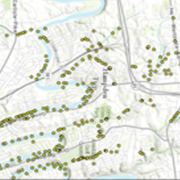Happy New Year!
Most people use this time of year to get organized, so that they can put their best foot forward over the next 12 months. Ads for your local hardware store are jam-packed with sales on storage bins and closet organizers.
But the need to be organized extends beyond the home into the office, too. With MS4 permit requirements on the rise, many municipalities have seen their program grow in complexity over the past 5-10 years. With that added complexity comes a lot of paperwork: mapping, inspection and maintenance reports, etc.
PA DEP and the EPA both conduct periodic audits of MS4 programs, and the first step of the audit is to review the municipality’s records. So it’s a good idea to make sure your files are complete and well-organized now – in case this is the year an auditor knocks on your door.
Most audits occur at random.
DEP uses the audit process as a way of educating local municipalities about what the MS4 program requires and answering municipalities’ questions about compliance. It is not meant to be an adversarial experience; it’s an opportunity to see whether your program is working and what you can do – if anything – to improve it. Because it is mostly an educational outreach, fines are rare at this time, but, in the coming years, audits will focus more on program results, and fines will be more likely. That’s why it’s important to get your MS4 program audit-ready now.

What documentation do you need to have for an MS4 audit?
DEP provides an Inspection Report, which lists the documentation inspectors typically will ask to see. However, the inspector can ask to see other documentation not specifically listed in the Inspection Report.

Is your stormwater mapping complete and MS4 audit ready?
In addition to the actual permit and program document, you should keep all monitoring data and reports for at least one year after the permit expires. You should also keep meeting minutes, inspection schedules and records, as well as documentation of illicit discharges and the methods used to resolve them.
You should have a thorough inventory (with mapping) of the location and function of all your stormwater facilities and any municipal facilities that impact your stormwater program. This includes:
- All of your outfalls with an outline of their drainage area.
- Inlets
- All of your post-construction BMPs (even those that are privately maintained. The MS4 is ultimately responsible for ensuring these facilities are maintained properly, even if private owners have agreed to perform that maintenance. Make sure you have a copy of the maintenance agreement you made with the private owner.)
- Maintenance and storage yards
- Composting sites
- Wastewater treatment facilities
- Streets and parking lots
Furthermore, you should assemble your policies and completion records for street sweeping and snow removal, lawn care and vehicle fueling and washing.
DEP says that poor or unavailable mapping is one of the main problems encountered in an MS4 audit. Even if you haven’t received notification of an impending audit, it’s a good idea to speak with your engineer about whether your existing mapping is adequate. By the time an audit notification arrives, it will probably be too late to update the mapping then.
DEP has gone on record saying that it hopes to audit each MS4 program once during its five-year permit term, so it isn’t a question of “if” you will be audited but “when.”
The list of records an auditor can request is extensive, so it is not the kind of information you can pull together quickly (particularly if your mapping needs updated). You ought to make sure your records are in order now.
In addition, your staff should be knowledgeable of the program and able to answer questions about it effectively. Your engineer can provide training to prepare your staff for MS4 audits, if desired.
With a little advance preparation, you can be sure you’re ready when DEP comes knocking on your door.
 Alex Greenly is a staff professional in HRG’s civil group. He regularly assists clients with MS4 permit compliance and has additional expertise in erosion and sedimentation control, hydrologic and hydraulic modeling, construction observation and municipal review of subdivision, land development, and stormwater management plans.
Alex Greenly is a staff professional in HRG’s civil group. He regularly assists clients with MS4 permit compliance and has additional expertise in erosion and sedimentation control, hydrologic and hydraulic modeling, construction observation and municipal review of subdivision, land development, and stormwater management plans.


